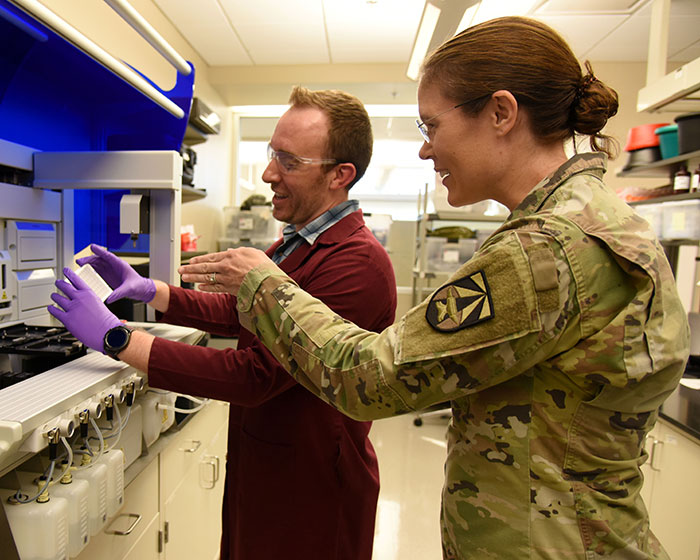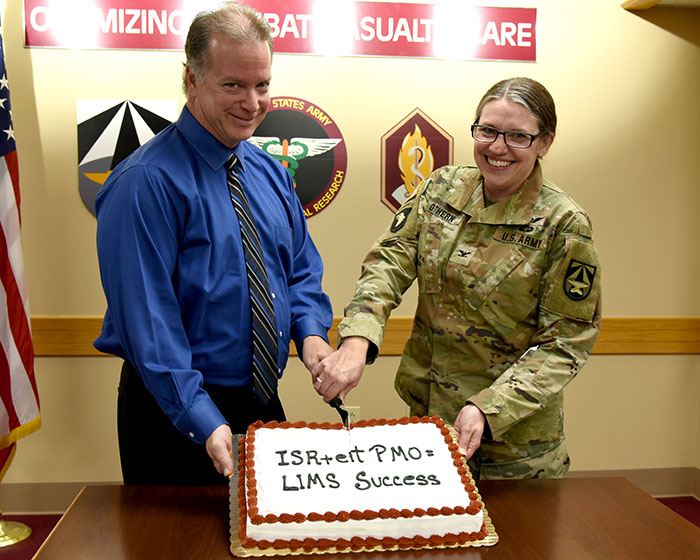MRDC Rolls Out 'Digital Brain' to Standardize Research Data for the Warfighter

FORT DETRICK, Md. — The U.S. Army Medical Research and Development Command has introduced a new capability, the Laboratory Information Management System, to manage data for military medical laboratories. This system aims to improve the efficiency and accuracy of research.
Traditionally, MRDC labs have relied on paper-based documentation, manual spreadsheets and home-grown databases for documenting medical research. These methods lead to non-standardized software, duplicated efforts and challenges in collaborating between sites. Moreover, labs face inconsistent internal processes and data standards, as well as the risk of intellectual property theft due to non-digitized records, while having difficulty transferring large research data sets on secure networks.
MRDC and the Enterprise Information Technology Project Management Office recognized the need for standardization and integrated capabilities within its practices. It aimed to implement an end-to-end digital data capability by working with LabVantage, an industry partner and provider of LIMS, to create a product that met the needs and standard requirements for military medical research. With the official launch of LIMS at the command's Institute of Surgical Research in August 2024, labs will now have access to a streamlined and standardized research system, which will aid in medical efforts for the Warfighter.
"By transitioning from a paper-based system to a digital Laboratory Information Management System platform, MRDC and the Defense Health Agency are poised to eliminate data silos, expedite research and optimize our return on investment," says Col. Denise Milhorn, military deputy for MRDC's Office of the Principal Assistant for Research and Technology.

LIMS is designed to be compliant with several federal regulations and industry standards that specify standards for electronic record keeping and signatures intended to support MRDC's medical research. Within labs, LIMS will help maintain the integrity and accountability of research data, secure intellectual property, deter adversary theft, maintain records and promote good stewardship of government funds, ultimately serving as a "digital brain" for the command.
According to the eIT PMO, LIMS will enable MRDC labs to more efficiently and effectively:
- Track inventory of samples and consumables.
- Manage samples through their entire lifespan with end-to-end traceability.
- Monitor samples across multiple locations.
- Monitor the accuracy of analytical methods using control samples.
- Quickly create and maintain laboratory master data.
- Search for data across the system.
- Get on-demand reporting and data visualization.
- Track analyst and instrument certifications.
- View a workflow's activity history.
- Generate dashboard, reports and barcodes.
- Track usage, maintenance and calibration of instruments and their parts.

Dr. Alan Weaver, a research scientist at ISR's Hemorrhage & Vascular Dysfunction Combat Casualty Research Team, explains that with several projects and team members to manage, LIMS will help with sample organization, inventory of reagents and organizing of other materials essential for advancing the research process.
"I do think the critical piece of LIMS will be how we improve the data collection of research information moving forward, which we talked about at length with MRDC and LabVantage," says Weaver. "LIMS will allow us to become fully functional in executing our research by implementing new things that are coming in the door."
Over the next year, MRDC plans to rapidly implement LIMS across its labs, adding USARIEM, USAMRIID and USAMRICD as eIT PMO collaborates with subject matter experts like Weaver and Lipiec. The next MRDC customer to receive LIMS this fall will be the Center for Military Psychiatry and Neuroscience at the Walter Reed Army Institute of Research.
"There is huge value with LIMS in being able to standardize data and compare it across studies so that we can understand our data and maybe increase the power of our results," says Capt. Stephanie Lipiec, program manager at ISR's Blood and Resuscitation Combat Casualty Research Team.














